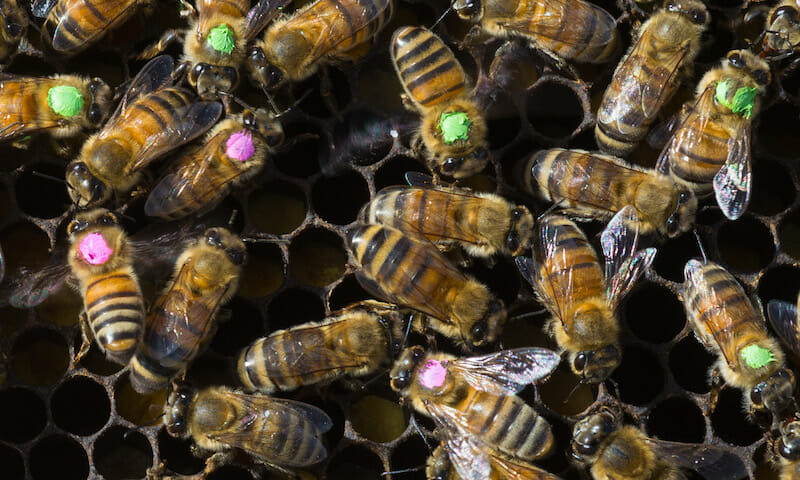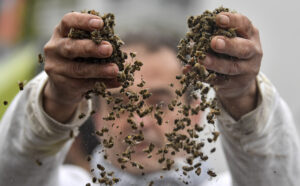Scientists Say Monsanto Weed Killer Contributes to Honeybee Deaths
The widely used herbicide Roundup, which some reports have linked to causing cancer, is also a major factor in the bees’ decline, a study says. Honeybees that were exposed to the chemical glyphosate were far more likely to die when later exposed to bacteria. (Marc Airhart)
Honeybees that were exposed to the chemical glyphosate were far more likely to die when later exposed to bacteria. (Marc Airhart)
The world’s most commonly used weed killer makes honeybees more susceptible to disease, according to a new study from researchers at the University of Texas at Austin. Glyphosate, the active ingredient in Monsanto’s Roundup herbicide, weakens bees’ gut bacteria, making them more likely to contract deadly infections.
“It’s not the only thing causing all these bee deaths, but it is definitely something people should worry about because glyphosate is used everywhere,” said Erick Motta, a graduate student and a leader on the study, which was published in the Proceedings of the National Academy of Sciences.
Bees, which are vital for pollination and food production, are in decline. The environmental advocacy group Greenpeace reports that since 2006 the U.S. honeybee population has declined by 40 percent.
“We need better guidelines for glyphosate use, especially regarding bee exposure, because right now the guidelines assume bees are not harmed by the herbicide,” Motta said. “Our study shows that’s not true.”
Glyphosate is also the active ingredient in Monsanto’s Ranger Pro herbicide.
“Claims that glyphosate has a negative impact on honeybees are simply not true,” Bayer, Monsanto’s parent company, told The Guardian. “More than 40 years of robust, independent scientific evidence shows that it poses no unreasonable risk for humans, animal, and the environment generally.”
California lists glyphosate as a known chemical to cause cancer. Scientists have also identified links between glyphosate and non-Hodgkin lymphoma.
In an earnings call this month, Bayer said it is facing 8,700 plaintiffs seeking damages over the effects of Roundup and Ranger Pro. Last month, a court ordered Monsanto to pay $289 million to one such plaintiff, a former San Francisco school groundskeeper who was diagnosed with non-Hodgkin lymphoma. Bayer denies responsibility.
Your support matters…
Independent journalism is under threat and overshadowed by heavily funded mainstream media.
You can help level the playing field. Become a member.
Your tax-deductible contribution keeps us digging beneath the headlines to give you thought-provoking, investigative reporting and analysis that unearths what's really happening- without compromise.
Give today to support our courageous, independent journalists.






You need to be a supporter to comment.
There are currently no responses to this article.
Be the first to respond.